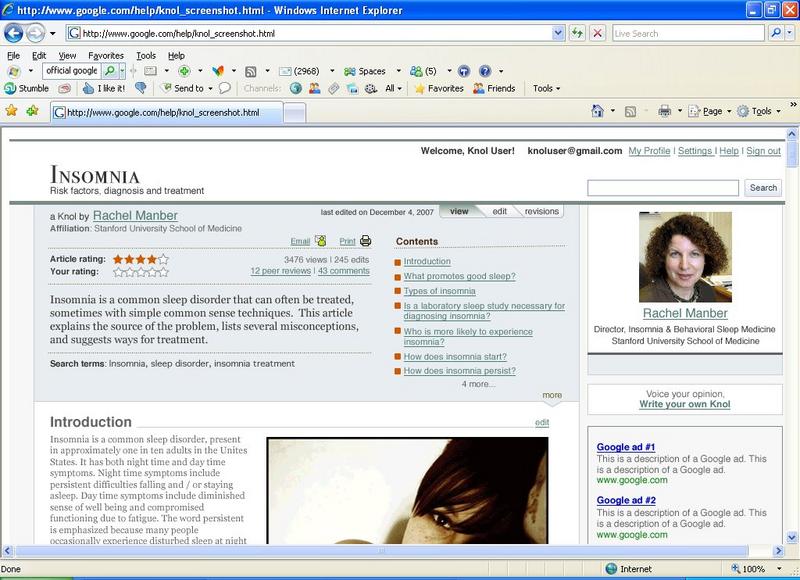Google announces knowledge sharing portal
The web giant has started trialing 'knol' to help people obtain and share knowledge about a range of topics.


Google is working on an online, community-based knowledge portal that could potentially give Wikipedia et al a run for their money.
Last week, the web giant kicked off a small invitation-only trial of the new, free tool dubbed 'knol,' although it was keen to stress that its latest innovation is still in the early stages of development and testing.
The trial's announcement was a fairly muted affair, with Google's official blog serving as knol's launch pad.
"The web contains an enormous amount of information, and Google has helped to make that information more easily accessible by providing pretty good search facilities. But not everything is written nor is everything well organised to make it easily discoverable. There are millions of people who possess useful knowledge that they would love to share, and there are billions of people who can benefit from it. We believe that many do not share that knowledge today simply because it is not easy enough to do that. The challenge posed to us by Larry, Sergey and Eric was to find a way to help people share their knowledge. This is our main goal," said Udi Manber, vice president of engineering in a blog post.
"The key idea behind the knol project is to highlight authors. Books have authors' names right on the cover, news articles have bylines, scientific articles always have authors - but somehow the web evolved without a strong standard to keep authors names highlighted. We believe that knowing who wrote what will significantly help users make better use of web content. At the heart, a knol is just a web page; we use the word "knol" as the name of the project and as an instance of an article interchangeably. It is well-organised, nicely presented, and has a distinct look and feel, but it is still just a web page. Google will provide easy-to-use tools for writing, editing, and so on, and it will provide free hosting of the content. Writers only need to write; we'll do the rest."
Google's ultimate aim is for a topic-specific knol - which stands for a unit of knowledge - to be the initial port of call for someone searching the topic for the first time.
Intended as community-building tools, knols will span all subjects from entertainment to science and beyond, including relevant references, links and rating features. However, although Google will provide the platform and authoring tools it will not have any editorial responsibilities or "bless any content."
Get the ITPro daily newsletter
Sign up today and you will receive a free copy of our Future Focus 2025 report - the leading guidance on AI, cybersecurity and other IT challenges as per 700+ senior executives
"Once testing is completed, participation in knols will be completely open, and we cannot expect that all of them will be of high quality. Our job in Search Quality will be to rank the knols appropriately when they appear in Google search results. We are quite experienced with ranking web pages, and we feel confident that we will be up to the challenge. We are very excited by the potential to substantially increase the dissemination of knowledge," Manber added.
Maggie has been a journalist since 1999, starting her career as an editorial assistant on then-weekly magazine Computing, before working her way up to senior reporter level. In 2006, just weeks before ITPro was launched, Maggie joined Dennis Publishing as a reporter. Having worked her way up to editor of ITPro, she was appointed group editor of CloudPro and ITPro in April 2012. She became the editorial director and took responsibility for ChannelPro, in 2016.
Her areas of particular interest, aside from cloud, include management and C-level issues, the business value of technology, green and environmental issues and careers to name but a few.
-
 Cleo attack victim list grows as Hertz confirms customer data stolen
Cleo attack victim list grows as Hertz confirms customer data stolenNews Hertz has confirmed it suffered a data breach as a result of the Cleo zero-day vulnerability in late 2024, with the car rental giant warning that customer data was stolen.
By Ross Kelly
-
 Lateral moves in tech: Why leaders should support employee mobility
Lateral moves in tech: Why leaders should support employee mobilityIn-depth Encouraging staff to switch roles can have long-term benefits for skills in the tech sector
By Keri Allan